Book
ISBN: 9780367183387 9780429060892 0429060890 9780367183400 9780429593789 0429593783 9780429595073 0429595077 9780429592492 0429592493 0367183382 Year: 2020 Publisher: London : Routledge,
Abstract | Keywords | Export | Availability | Bookmark
 Loading...
Loading...Choose an application
- Reference Manager
- EndNote
- RefWorks (Direct export to RefWorks)
Book
ISBN: 9780852246412 0852246412 Year: 1966 Publisher: Edinburgh University press
Abstract | Keywords | Export | Availability | Bookmark
 Loading...
Loading...Choose an application
- Reference Manager
- EndNote
- RefWorks (Direct export to RefWorks)
Hume, David --- Ethics, Modern - 18th century --- Emotions - History - 18th century --- Hume, David, - 1711-1776 --- Emotions --- Ethics, Modern --- Feelings --- Human emotions --- Passions --- Psychology --- Affect (Psychology) --- Affective neuroscience --- Apathy --- Pathognomy --- History --- Hume, David,
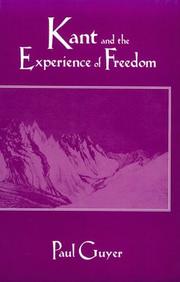
ISBN: 0521568331 9780521568333 0521414318 1139172514 9781139172516 9780521414319 Year: 1996 Publisher: Cambridge Cambridge University Press
Abstract | Keywords | Export | Availability | Bookmark
 Loading...
Loading...Choose an application
- Reference Manager
- EndNote
- RefWorks (Direct export to RefWorks)
This collection of essays by one of the preeminent Kant scholars of our time transforms our understanding of both Kant's aesthetics and his ethics. Guyer shows that at the very core of Kant's aesthetic theory, disinterestedness of taste becomes an experience of freedom and thus an essential accompaniment to morality itself. At the same time he reveals how Kant's moral theory includes a distinctive place for the cultivation of both general moral sentiments and particular attachments on the basis of the most rigorous principle of duty. Kant's thought is placed in a rich historical context including such figures as Shaftesbury, Hutcheson, Hume, Burke, Kames, as well as Baumgarten, Mendelssohn, Schiller, and Hegel. Other topics treated are the sublime, natural versus artistic beauty, genius and art history, and duty and inclination. These essays extend and enrich the account of Kant's aesthetics in the author's earlier book, Kant and the Claims of Taste (1979).
General ethics --- Aesthetics --- Kant, Immanuel --- Aesthetics, Modern --- Ethics, Modern --- Free will and determinism. --- Aesthetics, Modern - 18th century. --- Ethics, Modern - 18th century. --- Kant, Immanuel, --- Aesthetics. --- Ethics. --- Contributions in doctrine of free will and determinism. --- Ethics --- Free will and determinism --- Arts and Humanities --- Philosophy
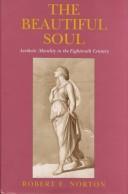
ISBN: 080143050X 9780801430503 Year: 1995 Publisher: Ithaca ; London Cornell University Press
Abstract | Keywords | Export | Availability | Bookmark
 Loading...
Loading...Choose an application
- Reference Manager
- EndNote
- RefWorks (Direct export to RefWorks)
Ame --- Soul --- Ziel --- Ethics, Modern --- Aesthetics, Modern --- Soul. --- 7.01 --- -Aesthetics, Modern --- -Soul --- 128 --- Pneuma --- Future life --- Philosophical anthropology --- Theological anthropology --- Animism --- Spirit --- Modern aesthetics --- Modern ethics --- Esthetica. Kunstfilosofie. Kunsttheorie. Algemene problemen inzake kunst --- De ziel --- 128 De ziel --- 7.01 Esthetica. Kunstfilosofie. Kunsttheorie. Algemene problemen inzake kunst --- Aesthetics --- History --- Ethics [Modern ] --- 18th century --- Aesthetics [Modern ] --- Ethics, Modern - 18th century. --- Aesthetics, Modern - 18th century.
Book
ISBN: 9048132266 9048132274 Year: 2010 Publisher: New York : Springer,
Abstract | Keywords | Export | Availability | Bookmark
 Loading...
Loading...Choose an application
- Reference Manager
- EndNote
- RefWorks (Direct export to RefWorks)
Karl Leonhard Reinhold (1757-1823) is a complex figure of the late German Enlightenment. Sometime Catholic priest and active Mason even when still a cleric in Vienna; early disciple of Kant and the first to try to reform the Critique of Reason; influential teacher and prolific author; astute commentator on the immediate post-Kantian scene; and at all times convinced propagandist of the Enlightenment––in all these roles Reinhold reflected his age but also tested the limits of the values that had inspired it. This collection of essays, originally presented at an international workshop held in Montreal in 2007, conveys this multifaceted figure of Reinhold in all its details. In the four themes that run across the contributions––the historicity of reason; the primacy of moral praxis; the personalism of religious belief; and the transformation of classical metaphysics into phenomenology of mind––Reinhold is presented as a catalyst of nineteenth century thought but also as one who remained bound to intellectual prejudices that were typical of the Enlightenment and, for this reason, as still the representative of a past age. The volume contains the text of two hitherto unpublished Masonic speeches by Reinhold, and a description of recently recovered transcripts of student lecture notes dating to Reinhold’s early Jena period.
Enlightenment. --- Ethics, Modern -- 18th century. --- Reinhold, Karl Leonhard, 1758-1823. --- Philosophy & Religion --- Philosophy --- Enlightenment --- Reinhold, Karl Leonhard, --- Philosophy. --- Modern philosophy. --- Modern Philosophy. --- Philosophy, general. --- History of Philosophy. --- Modern philosophy --- Mental philosophy --- Humanities --- Philosophy, modern. --- Philosophy (General). --- Philosophy, Modern. --- Philosophy—History. --- Early Modern Philosophy.
Book
ISBN: 0198248407 9780198248408 Year: 1989 Publisher: Oxford Clarendon
Abstract | Keywords | Export | Availability | Bookmark
 Loading...
Loading...Choose an application
- Reference Manager
- EndNote
- RefWorks (Direct export to RefWorks)
Ethics, Modern --- Virtue --- History --- -Virtue --- -Conduct of life --- Ethics --- Human acts --- Modern ethics --- -Hume, David --- -Hutcheson, Francis --- -Smith, Adam --- -ヒューム --- Contributions in ethics --- -History --- -Contributions in ethics --- Conduct of life --- Hume, David --- Hutcheson, Francis, --- Smith, Adam --- Ethics. --- Hutcheson, Francis --- Ethics [Modern ] --- 18th century --- Hutcheson, Francis, 1694-1746 - Contributions in ethics. --- Hume, David, 1711-1776 - Contributions in ethics. --- Smith, Adam, 1723-1790 - Contributions in ethics. --- Ethics, Modern - 18th century. --- Virtue - History - 18th century.
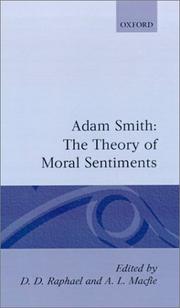
ISBN: 0198281897 9780198281894 Year: 1979 Volume: 1 Publisher: Oxford Clarendon
Abstract | Keywords | Export | Availability | Bookmark
 Loading...
Loading...Choose an application
- Reference Manager
- EndNote
- RefWorks (Direct export to RefWorks)
Ethics --- 170 --- 330.8 --- Deontology --- Ethics, Primitive --- Ethology --- Moral philosophy --- Morality --- Morals --- Philosophy, Moral --- Science, Moral --- Philosophy --- Values --- 330.8 Economisch denken. Economische scholen. Economische theorieen --- Economisch denken. Economische scholen. Economische theorieen --- Social ethics --- Economic schools --- Economics --- Classical school of economics --- Ethics, Modern --- Early works to 1800 --- Smith, Adam, --- Ethics. --- Morale --- economisch beleid --- politique economique --- Economics - Early works to 1800 --- Ethics, Modern - 18th century --- Ethics - Early works to 1800 --- Smith, Adam, - 1723-1790
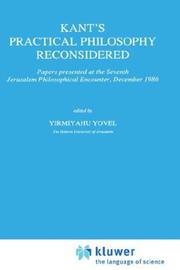
ISBN: 0792304055 9780792304050 9048140544 9401720169 Year: 1989 Volume: 128 Publisher: Dordrecht Kluwer
Abstract | Keywords | Export | Availability | Bookmark
 Loading...
Loading...Choose an application
- Reference Manager
- EndNote
- RefWorks (Direct export to RefWorks)
General ethics --- Kant, Immanuel --- Ethics, Modern --- Morale --- Congresses --- Congrès --- Kant, Immanuel, --- Ethics --- -Modern ethics --- -Contributions in ethics --- -Congresses --- Ethics, Modern. --- Congrès --- Kant, Emmanuel --- Kant, Emanuel --- Kant, Emanuele --- Contributions in ethics --- Ethics [Modern ] --- 18th century --- Congresses. --- Kant, I. --- Kānt, ʻAmmānūʼīl, --- Kant, Immanouel, --- Kant, Immanuil, --- Kʻantʻŭ, --- Kant, --- Kant, Emmanuel, --- Ḳanṭ, ʻImanuʼel, --- Kant, E., --- Kant, Emanuel, --- Cantơ, I., --- Kant, Emanuele, --- Kant, Im. --- קאנט --- קאנט, א. --- קאנט, עמנואל --- קאנט, עמנואל, --- קאנט, ע. --- קנט --- קנט, עמנואל --- קנט, עמנואל, --- كانت ، ايمانوئل --- كنت، إمانويل، --- カントイマニユエル, --- Kangde, --- 康德, --- Kanṭ, Īmānwīl, --- كانط، إيمانويل --- Kant, Manuel, --- Ethics, Modern - 18th century - Congresses. --- Kant (emmanuel), philosophe allemand, 1724-1804 --- Critique et interpretation
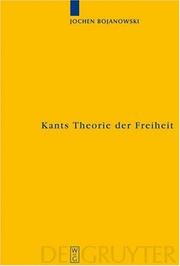
ISSN: 03406059 ISBN: 3110189445 9783110189445 3110909901 Year: 2006 Volume: 151 Publisher: Berlin: de Gruyter,
Abstract | Keywords | Export | Availability | Bookmark
 Loading...
Loading...Choose an application
- Reference Manager
- EndNote
- RefWorks (Direct export to RefWorks)
In der gegenwärtigen Debatte um die Willensfreiheit ist Kants Freiheitstheorie zu den Akten schlechter Metaphysik gelegt worden. Dabei sind entscheidende Fragen nach wie vor nicht zureichend geklärt: 1. Welchen Freiheitsbegriff nimmt Kant in Anspruch? 2. Welche Funktion kommt diesem Begriff zu? 3. Welchen Beweis erbringt Kant zu seiner Rechtfertigung? Der Autor weist nach, dass Kants Theorie in allen drei Punkten unangemessen repräsentiert worden ist und nimmt die Verhandlungen über ihre systematische Gültigkeit wieder auf. Bojanowski zeigt, warum eine bestimmte Form moralischer Praxis nicht ohne Kants Begriff der Autonomie als absoluter Freiheit auskommt; er verteidigt diesen Begriff auf der Grundlage von Kants Erkenntniskritik gegen deterministische Moralskepsis. Abschließend erklärt er, warum dieser Begriff nicht an der Möglichkeit moralisch böser Handlungen scheitert, sondern die Rede von moralisch bösen Handlungen erst ermöglicht. In the present-day debate on free will, Kant's theory of freedom has been dismissed as bad metaphysics. This however leaves decisive questions partially unanswered, namely 1. To what concept of freedom does Kant lay claim? 2. What functions are ascribed to it? 3. What proof does Kant advance to justify it? The author demonstrates that Kant's theory has not been adequately represented in all three points, and resumes the negotiation about its systematic validity. Bojanowski demonstrates why the practice of morality cannot dispense with Kant's concept of autonomy as absolute freedom, and on the basis of Kant's epistemic critique he defends this concept against a deterministic moral scepticism. In conclusion, he demonstrates why this concept does not fail when faced with the possibility of morally evil acts, but that in fact talking about morally evil acts is not possible without it.
Metaphysics --- General ethics --- Kant, Immanuel --- Liberty --- Autonomy (Philosophy) --- Ethics, Modern --- Philosophy --- Kant, Immanuel, --- Kant, Emmanuel --- Kant, Emanuel --- Kant, Emanuele --- Contributions in concept of freedom. --- Philosophy. --- Kant, I. --- Kānt, ʻAmmānūʼīl, --- Kant, Immanouel, --- Kant, Immanuil, --- Kʻantʻŭ, --- Kant, --- Kant, Emmanuel, --- Ḳanṭ, ʻImanuʼel, --- Kant, E., --- Kant, Emanuel, --- Cantơ, I., --- Kant, Emanuele, --- Kant, Im. --- קאנט --- קאנט, א. --- קאנט, עמנואל --- קאנט, עמנואל, --- קאנט, ע. --- קנט --- קנט, עמנואל --- קנט, עמנואל, --- كانت ، ايمانوئل --- كنت، إمانويل، --- カントイマニユエル, --- Kangde, --- 康德, --- Kanṭ, Īmānwīl, --- كانط، إيمانويل --- Kant, Manuel, --- Liberty - Philosophy --- Ethics, Modern - 18th century --- Kant, Immanuel, - 1724-1804 --- Determinism. --- Kant (Immanuel). --- free will. --- freedom ‹term›.
Book
ISBN: 0729402657 9780729402651 Year: 1981 Volume: 200 Publisher: Oxford Voltaire foundation
Abstract | Keywords | Export | Availability | Bookmark
 Loading...
Loading...Choose an application
- Reference Manager
- EndNote
- RefWorks (Direct export to RefWorks)
Crébillon, Claude-Prosper Jolyot de, --- Criticism and interpretation --- Aesthetics, Modern --- Ethics, Modern --- Crébillon, Claude-Prosper Jolyot de, --- -Ethics, Modern --- -Modern ethics --- Modern aesthetics --- Crebillon, Claude-Prosper Jolyot de --- -Criticism and interpretation --- -Crebillon, Claude-Prosper Jolyot de --- Aesthetics --- History --- Jolyot de Crébillon, Claude-Prosper, --- De Crébillon, Claude-Prosper Jolyot, --- Crébillon, --- Krebiĭon-syn, --- Krebilion, --- Criticism and interpretation. --- Aesthetics, Modern - 18th century --- Ethics, Modern - 18th century --- Crébillon, Claude Prosper --- Crébillon, Claude-Prosper Jolyot de, - 1707-1777 - Criticism and interpretation --- Crébillon, Claude-Prosper Jolyot de, - 1707-1777

 Search
Search Feedback
Feedback About UniCat
About UniCat  Help
Help News
News